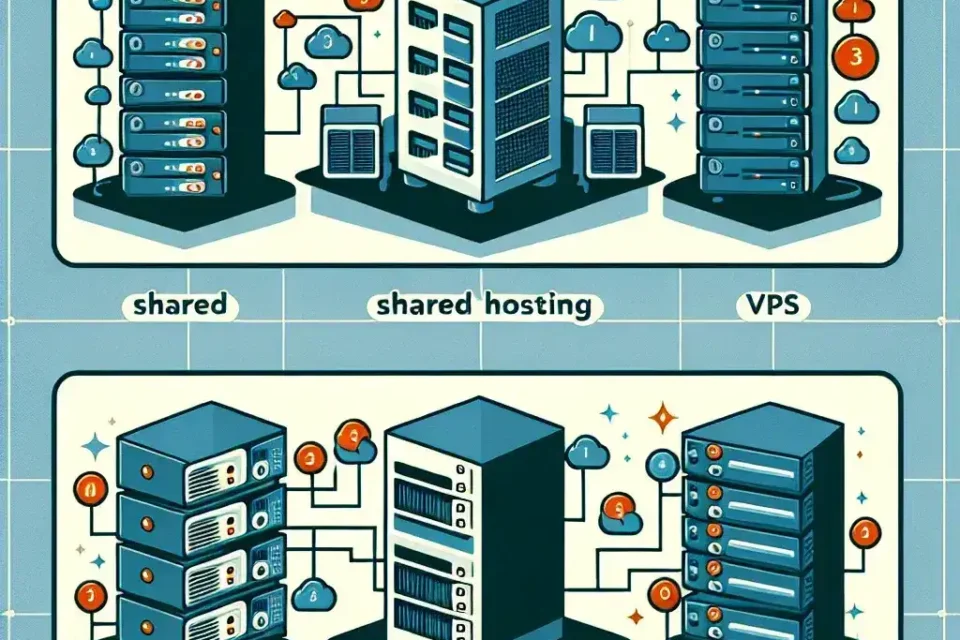How is shared hosting different from VPS and dedicated hosting?

When it comes to web hosting, there are three primary types to consider: shared hosting, VPS (Virtual Private Server) hosting, and dedicated hosting. Each type has its pros and cons, and the right choice largely depends on the specific needs and scale of your website. In this comprehensive guide, we’ll explore the major differences between these three hosting options and help you make an informed decision.
Understanding the Basics: Shared Hosting, VPS Hosting, and Dedicated Hosting
Before diving into the differences, it’s essential to understand what each type of hosting entails:
| Hosting Type | Definition |
|---|---|
| Shared Hosting | Multiple websites share the same server resources, making it a cost-effective option. |
| VPS Hosting | Offers a virtualized server environment where resources are allocated to each user, providing more control and flexibility. |
| Dedicated Hosting | A single server dedicated to one user, offering maximum performance and control at a higher cost. |
Shared Hosting
Advantages:
- Cost-effective: Shared hosting is typically the cheapest option, making it ideal for beginners and small websites.
- Simplicity: Easy to set up and manage, requiring minimal technical knowledge.
- Maintenance: Server maintenance is handled by the hosting provider.
Disadvantages:
- Limited Resources: Sharing resources (CPU, RAM, bandwidth) with other websites can affect performance and speed.
- Security Risks: Vulnerabilities in other websites on the same server could potentially affect your site.
- Lack of Control: Limited control over server settings and configurations.
VPS Hosting
Advantages:
- Improved Performance: Dedicated resources for each user result in better performance and reliability.
- Scalability: Easy to scale resources (RAM, CPU, storage) as your website grows.
- Enhanced Control: Greater control over server configurations, including root access.
- Better Security: Isolated environments enhance security and reduce risks from neighboring websites.
Disadvantages:
- Cost: More expensive than shared hosting, though still affordable for most growing websites.
- Technical Knowledge: Requires more technical expertise to manage and configure.
Dedicated Hosting
Advantages:
- Maximum Performance: Entire server resources are dedicated to one user, providing optimal performance.
- Complete Control: Full control over server settings, configurations, and software installations.
- Exclusive Security: Reduced risk of security threats from other websites.
Disadvantages:
- High Cost: The most expensive option, suitable for large websites or businesses.
- Technical Expertise: Requires significant technical knowledge to manage and maintain.
Key Differences Between Shared, VPS, and Dedicated Hosting
To further clarify how these hosting types differ, let’s compare them across several critical factors:
Cost
- Shared Hosting: Most affordable, starting as low as a few dollars per month.
- VPS Hosting: Mid-range pricing, typically between $20-$100 per month.
- Dedicated Hosting: Premium pricing, often exceeding $100 per month.
Performance
- Shared Hosting: Performance can be inconsistent due to shared resources.
- VPS Hosting: More reliable performance with dedicated resources.
- Dedicated Hosting: Optimal performance with exclusive server resources.
Scalability
- Shared Hosting: Limited scalability; upgrading often requires moving to a different hosting plan.
- VPS Hosting: Easily scalable; add resources as needed without changing plans.
- Dedicated Hosting: Highly scalable; upgrade server components but often requires more involved changes.
Control
- Shared Hosting: Minimal control over server settings.
- VPS Hosting: Significant control, including root access.
- Dedicated Hosting: Full control over the server.
Security
- Shared Hosting: Potential security risks from other websites on the same server.
- VPS Hosting: Enhanced security with isolated environments.
- Dedicated Hosting: Superior security due to exclusive server use.
Which Hosting Should You Choose?
Your choice among shared hosting, VPS hosting, and dedicated hosting depends on your specific needs:
- Shared Hosting: Best for personal blogs, small websites, or startups with limited budgets.
- VPS Hosting: Ideal for growing websites or eCommerce platforms requiring better performance and more control.
- Dedicated Hosting: Suitable for large businesses, high-traffic websites, or resource-intensive applications needing maximum performance and security.
Conclusion
Understanding the differences between shared hosting, VPS hosting, and dedicated hosting is crucial for choosing the right solution for your website. While shared hosting offers a cost-effective entry point, VPS hosting provides a balance of performance and control, and dedicated hosting delivers the ultimate in performance and customization. Assess your website’s needs, growth potential, and budget to make an informed decision.
